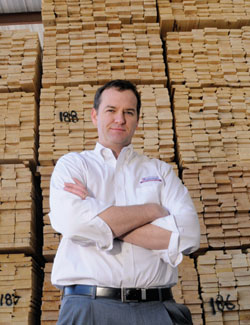New Rules
All that being said, dealers contacted for this article also agree that maintaining relationships with banks often means playing by new rules. Nearly 12% of dealers who responded to a recent ProSales survey about how they are coping with the credit crunch said their banks had altered the terms of their credit agreement. And more than one-fifth of respondents said their banks have taken a more active role in their businesses. That “involvement” varies widely, from asking more questions to putting liens on a dealer’s cash flow and demanding a seat on a dealer’s board of directors. But a common thread cited by dealers is how banks are reviewing their balance sheets with far greater scrutiny.
“We’re doing reporting on our collateralized debt on a daily basis because that’s what the bank wants,” says Brent Hanby, executive vice president for National Home Centers in northwest Arkansas, where he says “banks have completely shut down. They aren’t interested in making new loans, even with Grade A customers. Our lender–which is among the top five banks in the country–is getting out of a lot of deals, and it would be extremely difficult for us if we wanted to extend our credit or borrow.”
National’s relationship with its lender is “okay,” says Hanby, but his company is surviving on cash reserves that “aren’t endless.” This dealer can’t afford to lose its access to credit, so National continues to reduce inventory, cut staff, and pay down debt voluntarily “and as fast as we can, because the ability of the bank to renegotiate [loan terms] is nonexistent; they tell us they are taking their orders from New York.” In January, National reduced its yard count to eight when it closed its Heber Springs, Ark., location.
“Do you print curse words?” asks Dennis Grubbs, CFO for Causeway Lumber of Fort Lauderdale, Fla., in response to a question about his company’s relationship with its banks. “Pro dealers are getting tarred with the same brush as builders” in a market where new-home starts have fallen by 85%. During the downturn, Causeway has closed three of its four yards, and has scaled back its credit line to around $1 million from $6 million. Grubbs says his company’s “biggest problem” has been staying within the parameters of financial covenants that banks impose to keep a loan from defaulting. “It’s really crazy, and the banks are making it very tough” by tacking on higher fees and rates, Grubbs says.
Some banks are also demanding that dealers put up more equity before they’ll lend money, and back those loans with personal assets. Builders commonly back construction and land development loans with personal guarantees, but Tim Murphy thinks it’s a bad precedent for dealers to follow.
“I would say ‘Don’t do it in a million years,'” says Murphy, who is executive director for the Indiana Lumber and Builders’ Supply Association (ILBSA). “There’s always the opportunity for fraud when you give someone your Social Security and tax information. Plus, if your business is your primary source of income, what else are you putting up?”
Familiarity Breeds Access
In this environment of turmoil and mistrust, dealers must take the initiative to protect their companies’ interests. Ganahl says that while he’s perfectly happy with the service Bank of America provides, “as a hedge” he has “a good talking relationship” with several other financial “alternatives” by showing them his company’s annual financial statements. “That’s just being prudent,” he explains.
Murphy says he has “fired” banks in the past, as when ILBSA switched to National City three years ago because its previous lender, Bank One (which was taken over by Chase), “kept switching people on us.” And even after National City became part of PNC Bank, Murphy says he’s still dealing with the same account manager who he sees at church every Sunday and at a local businessmen’s meeting every Friday.
“There are three people you need to have on your speed dial,” Murphy continues. “Your attorney, your accountant, and your banker. It’s important to maintain a social relationship with your banker because at some point you’re going to have to borrow money again.”
However, dealers also say it takes perseverance these days to keep banks focused on their credit and transactional needs, as banks are cutting their staffs and managing accounts with greener personnel. Wayne Carver can attest to this from personal experience. Carver manages Stephens Inc. in Fuquay-Varina, N.C., which operates a seven-acre lumberyard, a 20,000-square-foot Ace Hardware, and a lighting center. It has a $2 million line of credit with BB&T, where Carver had had a long-term relationship with one manager. But that manager left in 2006, and Carver says his replacement simply lumped Stephens in with other retailers in terms of gauging its financial performance.
It took Carver three years to get his new account manager to understand his company’s profit and loss statement. He did this by sharing with that manager comparable financial data from 10 dealers with which Stephens comprises a roundtable of the Southern Building Material Association. Carver’s campaign paid off, and his bank manager has asked him several times during the downturn whether Stephens’ line of credit is large enough. BB&T also handles Stephens’ checking account and its investments for growth–”when we’re growing, that is,” Carver says.

